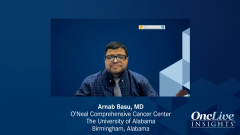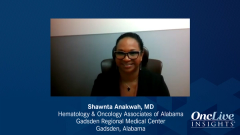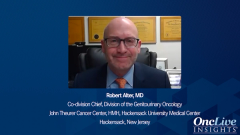
Adverse Events in IO-IO Combination Treatment Regimens for Advanced RCC
Key opinion leaders discuss the common adverse events seen with IO/IO combination regimens and how to treat patients with brain metastases.
Episodes in this series

Arnab Basu, MD: In your experience, what are some of the commonly observed adverse events in this IO [immunotherapy]/IO combination therapy regimen, and how do you manage those?
Shawnta Anakwah, MD: Typically, the ones that I’ve seen have been rash, diarrhea, hypothyroidism, and they were all just managed, they were typically grade 1. With the rash, usually I can manage it topically, the diarrhea with Imodium, with hypothyroidism, just with thyroid replacement. And all the patients have done very well, in my population.
Arnab Basu, MD: What is your threshold to discontinue IO/IO therapy?
Shawnta Anakwah, MD: I would say that patients who have grade 3 toxicities, specifically patients who have severe pneumonitis, very severe colitis, with the reasons that I would be very afraid to continue or rechallenge them.
Arnab Basu, MD: What about these endocrine adverse effect, in your experience? How have patients done with the discussion about therapy continuation in those settings?
Shawnta Anakwah, MD: I’ve only dealt with this a couple of times. Usually with dose interruption, steroids, thyroid replacement, testosterone replacements, I’ve had pretty good success of convincing patients, to rechallenge them on treatment, and they have done well.
Arnab Basu, MD: Great. With endocrine toxicities, frequently we have the ability to manage those on a long-term basis. And since the toxicity has already occurred, we can get patients the benefit of pretty good IO should they choose to continue. That’s great to hear. Do you ever switch to an IO/TKI [tyrosine kinase inhibitor] setting, in the setting of other grade 3 adverse effects?
Shawnta Anakwah, MD: You mean from an IO/IO toxicity?
Arnab Basu, MD: IO/IO, yes, just curious if you’ve ever done that. Why or why not?
Shawnta Anakwah, MD: I wouldn’t be opposed to it, specifically depending on what the toxicity was, how frail the patient was. If it was a young patient, I would consider switching to an IO/TKI vs if it was an older, frail patient, I would probably just use a single agent. Then upon progression, switch to a TKI for the next line of therapy.
Arnab Basu, MD: That’s a great approach, I would agree with that. There is no grade 1 evidence in this space. Indeed, there are several trials we’ll talk about that kind of go through this. There are some data for pembrolizumab and lenvatinib in a refractory setting, which came out from [KEYNOTE-146], I believe, which was a study in a refractory setting. But there are few grade 1 data for an IO/TKI rechallenge after progression on a frontline regimen. The data do not support that at this time.
Shawnta Anakwah, MD: Dr Basu, how do you treat patients with advanced RCC [renal cell carcinoma] and brain metastases?
Arnab Basu, MD: That’s an interesting question, and there are some upcoming data on it. There is some evidence that doublet immunotherapy is active in brain metastases. Although, most phase 3 clinical trials exclude patients with brain [metastases]. There is an ongoing, phase 3b/4 study called CHECKMATE 920, which has a cohort of patients with advanced RCC and asymptomatic small brain metastases. In that study, with a median follow-up of around 2 years, a majority of patients with intracranial metastases remained free of progression in the brain. I certainly think of a doublet IO regimen for patients with brain metastases. That said, large symptomatic metastases need immediate intervention and/or radiation therapy and/or surgery at a large, specialized center. I know you and I work together on a lot of cases. But speaking of these referrals, what percentage of patients do you usually refer to an academic center? And for what specific reasons would you do that? This being one, but do any others come to mind?
Shawnta Anakwah, MD: I refer about 15% to 20% of my patients to academic medical centers. As far as the RCC cases, typically patients who are very young or who have a very aggressive subtype, or patients who progressed on first-line therapy rapidly, those are typically patients I would refer. Other patients and other tumor types, or typically patients where I feel like they would benefit from more aggressive surgery, where they would benefit from a radical nephrectomy with a thrombectomy, those kinds of cases would be better served at an academic medical center. Specifically my patients with rectal cancer, I prefer for them to go to academic medical centers, or my very complex colon cases as well, with few liver lesions, where I feel like they’re young and could be more aggressively managed.
Arnab Basu, MD: Great points. From a surgical standpoint and complex medical issue standpoint, those are definitely cases that benefit from a deeper look at what’s going on. Also, I think trial patients, patients who are young and fit who benefit from some novel therapies might be good options.
Transcript edited for clarity.










































